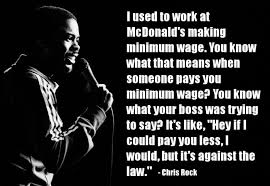There comes a time in every man’s life when he thinks: “Huh, this job sucks. Why am I here?” And it is indeed a very good question. Blessed not are the proletariat masses who punctually arrive at work, only to question the work they do, and by extension, the meaning of life. But rather than pass a joint and write poetry, I will continue my series on Quantitative Philosophy and instead enlist the field of mathematics to answer these questions.
Actually, I’m just going to calculate whether or not your job’s compensation is sufficient for its level of stress, and subtly suggest whether or not you should seek alternate employment. How will I do this? Why, the same way I compile data for all subjective forms of human existence: polls.
And don’t you judge me, all you MBAs out there. In my experience, employers have carefully calculated just how little they can pay for a given job, and they do this well, otherwise we wouldn’t have minimum wage laws. This is merely an extension of that philosophy, only calculated from the employee’s side instead.

We will start with a job’s variables that make it less desirable, or as I will translate: things which cause stress (Stress Factors). Through discussion, the common complaints and therefore sources of job stress are:
- Superiors
- Suboordinates
- Customers/Clients
- Coworkers
- Self (Internal stress, related to self-actualization)

Financial compensation is obviously the primary negator, but a broader perspective of that is what we do with the paycheck that negates the stress. Therefore, we start with the weekly net income, and from this figure subtract the negators (or, negators from the negator–double negatives). Again, using poll data, I have narrowed these variables to:
- Weekly gross income of minimum wage (because you have to be making more than minimum wage to have disposable income, and this is a base figure for which we all weigh our financial success)
- Weekly estimated cost of alcohol consumption (substitute your drug of choice)
- Weekly estimated cost of luxury edibles (fine dining–a universal constant)
The assumption being made is that the minimum required amount of excess finances to achieve happiness with an average stress level of 65% at a weekly net income of $450. This sets the baseline…or at least it did. Minimum wage has gone up considerably since I made this calculator, so the explanation is no longer consistent with the math. Now it appears that for the given salary, a job caps at about 25% the maximum level of stress a job could offer. This is a pretty low level of stress. In any case, here is the formula:
(0.14(net income – (sum of negators)))/0.5(sum of stress factors +1))
And as before, the formula is scaled, this time to range from 0-5 (5 being the ideal job), with each stress factor receiving a rating of 0-10, 10 being the most stress. Inputting my own figures, I receive a 4.33. Hmmm, I’m not so certain that this has scaled well with time, or if it’s entirely linear. A job with a maximum stress level appears to only require a weekly net income of ~$585, and I would not be a stock broker for less than $60K a year. But it does appear that I’m on version 6 of this calculator as of 1/7/16, so it may be due for an update. Also, it doesn’t account for an area’s cost of living, so adjust the minimum wage accordingly.
In any case, give it a try and find out where you rank. I can tell you with certainty that if you rank below a 1, scaling issues aside, your job sucks and you need to find a new one (I told you I would give a subtle suggestion). Now stop reading this and get back to work!
https://moorheadfamily.net/data/Effort%20Quotient%20v6.xlsx
–Simon
